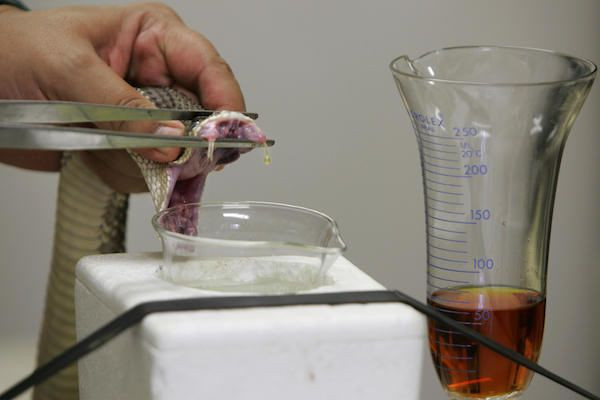Scientists Grow Venom-Producing Glands In Lab, Could Be Used Against Snake Bites

New drugs and antidotes could soon be sourced from lab-grown snake venom-producing gland replicas.
A group of researchers in the Netherlands have succeeded in growing replicas of snake glands that produce venom. The scientists did not just come up with one mimic, but multiple lab-grown glands similar to those of several species of snakes.
The experiment, conducted by Hubrecht Institute stem cell biologist Hans Clevers and his team, initially started with just one species of snakes, the Cape coral snake (Aspidelaps lubricus).
The researchers obtained stem cells of Cape coral snakes by dissecting them from eggs before hatching. The stem cells were then subjected to appropriate conditions, so they would grow and form different types of organoids.
One type of organoids that grew from the experiment was capable of producing venom similar to the normal venom that real snakes produce. Clevers’ team conducted the same experiment on six other species of snakes to yield more organoids hat closely resemble real venom-producing glands.
The main goal of the scientists when they performed the experiments was to know if they could come up with lab-grown organoids with similar properties to the organs they mimic. The experiments they conducted were part of a bigger study entitled “Stem Cell-Based Organoids as Avatars in Human Disease.”
Interestingly, they may have found the first step to creating an alternative for snake farms. If they could extract venom from the organoids, they could use the said venom in making new drugs and antidotes for snake bites. This could then encourage labs to ditch the practice of obtaining venom from snakes raised on farms.
According to the World Health Organization, around 5.4 million people are bitten by snakes each year. Of the estimated figure, about 2.7 million involve venomous snakes. Then around 81,000 to 138,000 people die yearly because of snake bites.
Clevers disclosed to Science News that they are hoping to harvest venom from their lab-grown organoids soon. According to him, this would be more advantageous and easier to do than milking snakes because the replicas produce more highly concentrated venom than real snakes.
Clevers presented his team’s research on Dec. 10 at a joint meeting of the American Society for Cell Biology and the European Molecular Biology Organization at the San Diego Convention Center, which runs from Dec. 8-12.
© Copyright IBTimes 2024. All rights reserved.




















